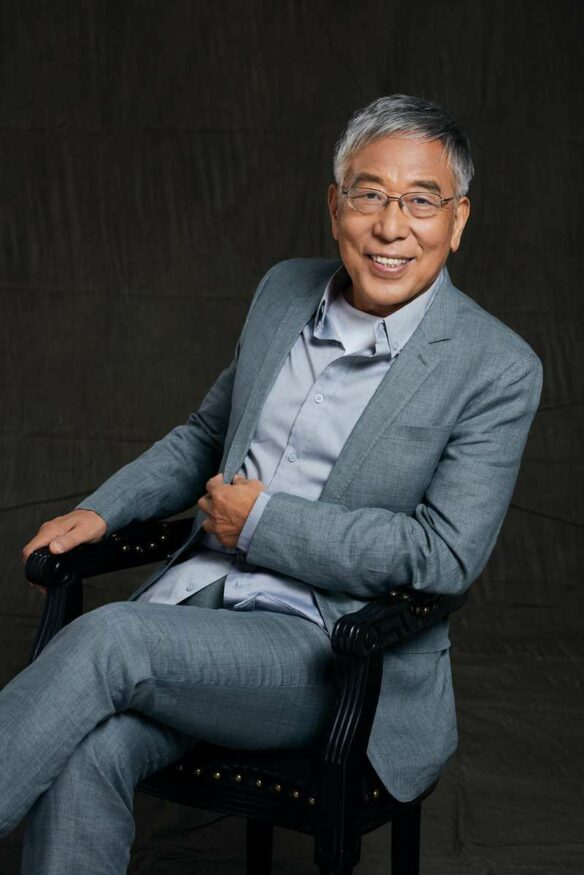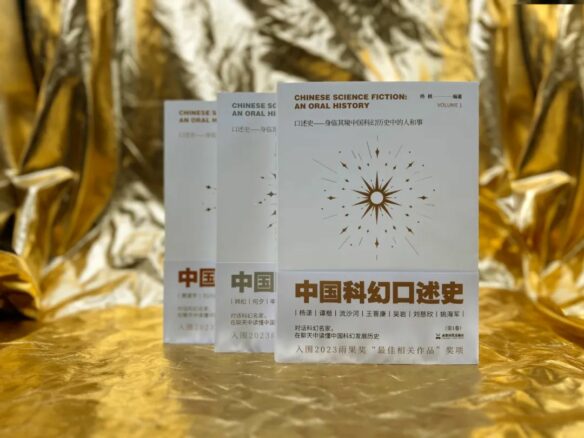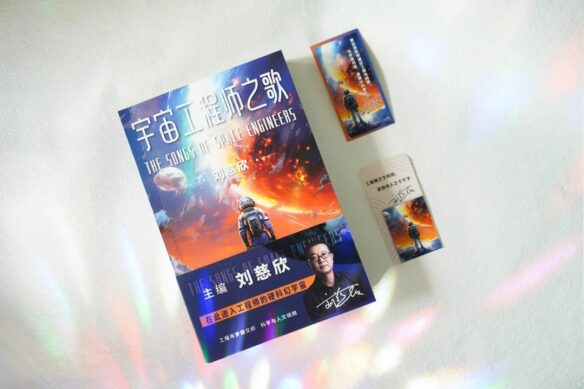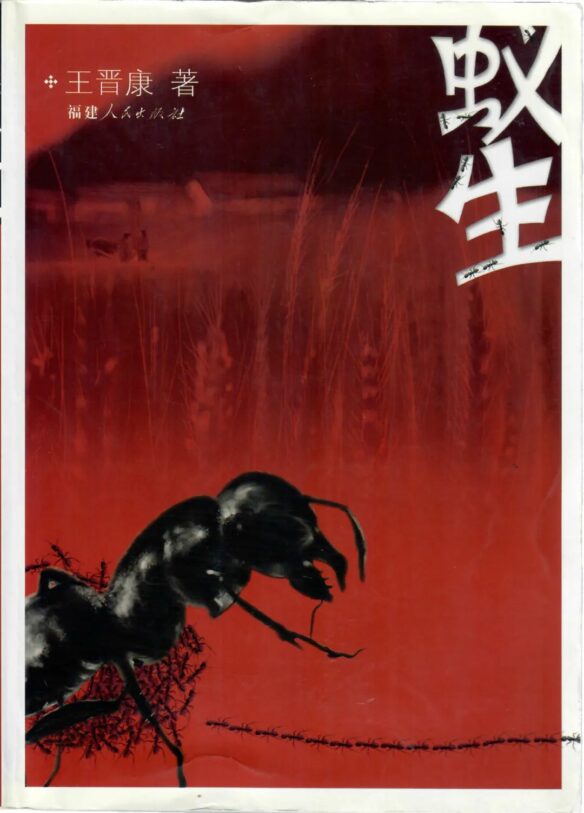(1) GLASGOW 2024 IN MEMORIAM LIST. The Worldcon In Memoriam 2024 was played today during Opening Ceremonies.
This is a listing of members of our community who have passed away since the last In Memoriam list was compiled for Pemmi-Con and Chengdu last year. This covers the period from July 9, 2023 to July 15, 2024. Any submission received after the 15th July was passed along to Seattle Worldcon.
(2) BIG HEART AWARD. The recipient was honored during Opening Ceremonies. “This award is given to those who go above and beyond in welcoming new people to fandom, and supporting the ideals of fandom.”
(3) SPECIAL COMMITTEE AWARD. Glasgow 2024 is giving a Special Committee Award to the game Dungeons & Dragons. The award is described as “an armadillo with a traffic cone on its head, and a resin die underneath it”. Okay. Photograph on Flickr.

(4) CHINESE VIDEO TOUR OF GLASGOW DEALERS ROOM. [Item by Ersatz Culture.] From the Eight Light Minutes publisher’s Weibo, a 47 minute video. See it at the link: 2024Worldcon @八光分文化的微博 – 微博. I think there might be footage of other areas, but I only skim-watched bits of it.
(5) A NATION OF RIBBON CLERKS. Here are a couple examples of private edition ribbons people are handing out at Glasgow 2024.
Hugo, Girl! podcast is distributing this set. (Photo courtesy of Scott Edelman).

On behalf of Diabolical Plots:
(6) A CALL FOR GRACE. Caitlin R. Kiernan suspects their criticisms here will be “Falling on Deaf Ears”, a blog entry at Dear Sweet Filthy World.
…I made [two posts] to Facebook, and I will say up front, yes, both were inspired by the way I’ve seen George R.R. Martin slurred and mocked over nothing in the past couple of weeks. The most childish, mean-spirited, petty shit, and often from authors I thought I respected, who I would have imaged to be above schoolyard taunts. Generally, I usually miss the stuff, Writers bore me, and I tend to avoid them online….
[The second was:] We are all standing on the shoulders of giants. Don’t like that? Tough. We can do what we can do because someone was there before us. This is very true in publishing, maybe especially true in speculative fiction. And we should show respect to our elders (and that’s what they are), even when their poltics do not align with our own. You think you’d have as many opportunities had there never been a, say, George R.R. Martin? Really? We *owe* these people. They opened doors, and, you know, if they don’t fit *your* sensibilities, stop and think of all the reasons that might be. Jesus, did we forget how to cut folks some slack? I think we did. This is not about who was the most transgressive or progressive at some earlier point in history; this is about having the decency to respect those who have gone before. Egalitarianism is all fine and well, until it becomes an excuse to act like a shit.
Postcript: Fuck, I’m 60. Stop and try to imagine what it was like just getting publishers to buy stories about queer and trans characters when I began publishing in 1993……This is why I have never been part of this “community,” why I have never even really tried….
(7) MEANWHILE, ABOUT THOSE CHENGDU HUGOS. The Chengdu Worldcon Hugo Awards belonging to non-attending winners arrived in the United States in late January, but as Dave McCarty told Chris Barkley, all of the display cases and some of the awards were damaged in transit from China. They either needed to be repaired, or replacement parts made. There having been no word five months later, in June, Barkley started asking those waiting if they’d gotten theirs. Nope. Now there’s been some action – and the results are alarming. Here’s a Hugo just received by a Hugo, Girl! podcaster.

(8) CLARION WEST COMMENTS ON GAIMAN, DISCUSSES THEIR POLICIES. Clarion West has posted a statement about the allegations against Gaiman and more specifically about how they select instructors and respond to sexual harassment or abuse at the workshop. They issue a call for transparency and action in the SFF community as a whole. “Silence Does Not Lend Itself To Change”.
News of the allegations against Neil Gaiman began breaking as this year’s six-week workshop hurtled into its third week. As we emerge from the workshop and have time to process this news, our board and staff want to take a moment to recognize that a culture of silence and protecting prominent authors has been widespread in the SFF community, and that it often disproportionately affects the most marginalized and vulnerable in our society. The silence, and its impact, is not acceptable.
This is an important conversation for everyone in the SFF community about protecting the most vulnerable in our industry from predation, and how to learn to listen to victims and make it easier for them to come forward without causing them further harm.
The Clarion West board of directors and our entire team are deeply invested in establishing a safe and harassment-free environment for those who participate in our programs.
How do we do this?
We believe that personal behavior is as important as professional standing and endeavor to make selections for instructors based on what we know of their personal and professional comportment. The process for instructor selection allows for concerns to be heard, both during selection meetings and privately.
To address concerns around instructor behavior, Clarion West has had a written instructor policy against harassment or sexual misconduct with students for at least 25 years. This policy is given to every workshop instructor. Neil Gaiman received a copy of this policy when he taught for us in 2013. Organizers were not aware of accusations or inappropriate behavior by Gaiman prior to inviting him, nor were they made aware of any abusive behavior during his tenure.
In more recent years, the organization has created and posted our Code of Conduct and an Anti-Harassment Policy publicly. We’ve made significant efforts to improve the process for students, staff, and community members to report harassment as well as the procedure for investigation and follow-up. The organization seeks to create transparency around the workshop and all programs.
Clarion West takes any reports of misconduct among our community members seriously and is dedicated to improving the experience of writers in speculative fiction, especially those historically underrepresented in publishing. We pledge to continuously review and update our policies, investigate accusations thoroughly, and work toward maintaining safe and inclusive spaces.
If you have information to share, concerns or questions about our policies, or wish to report abusive behavior related to the workshop or other Clarion West programs, please contact us at report@clarionwest.org.
(9) JEFF WARNER OBIT. Veteran conrunner Jeff Warner, who co-founded I-CON, has died. Michael Dauenheimer paid tribute on the convention’s Facebook page.
For those of you who weren’t fortunate enough to know Jeff Warner, he showed a life-long devotion to Science Fiction fandom. As a Stony Brook student, Jeff was one of the founding members of I-CON, helping to plan and run the first one on the SB campus in 1982.
He was also heavily involved with the Science Fiction Forum during his students years and continued to show concern and be involved when he could, attending reunions and staying touch with old friends.
Jeff was one of a kind. One of those unforgettable characters that you thought only existed in movies. He was definitely a people person and showed more “team spirit” than any athlete possibly could. When it came to conventions, Jeff tried to attend as many as he could, more often than not, volunteering to help them run. To him it was his passion to promote and foster Science Fiction fandom….
He will be greatly missed by many. He will not be forgotten.
Warner was briefly onscreen and is named in the credits of The People vs George Lucas (2010), a documentary about Star Wars fans. He was active as a File 770 contributing editor, supplying the titles of three Scrolls: Pixel Scroll 9/4 The Scrolling Stones, Pixel Scroll 12/28/19 Pixel Gadol Hayah Scroll, and Pixel Scroll 2/4/24 Pixel, Pixel, Scroll And Stumble. File Churn And Cauldron Double.
(10) COMICS SECTION.
- Brewster Rockit has a translation for everyone.
- Non Sequitur looks ahead to see back.
(11) I GET MY SIDEKICKS FROM. [Item by Daniel Dern.] A CBR.com columnist granted a reader’s wish to give superheroes kid sidekicks: “Line it is Drawn: Superheroes Gain New Kid Sidekicks”. The image of Doctor Manhattan’s new sidekick Kid Manhattan image is obviously (to those of us with long memories etc) an homage to this Superman cover (per “Supergirl’s First Comic Appearance: Everything Fans Need To Know”.
(12) GOOD NEWS FOR FANHISTORIANS. Richard Graeme Cameron was happy to announce today that the audio department of the Special Collections Library at Simon Fraser University of Burnaby B.C. has offered to conserve and digitize the audio tapes of early VCON convention events. The other day Cameron had put out a plea for a collection that would take responsibility for them.
Simon Fraser University Science Fiction Society (SF3) was one of the three organizations sponsoring the first VCON back in April of 1971. The other two sponsors were the B.C. Science Fiction Association (BCSFA) and the University of B.C. Science Fiction Society (UBC SFFEN). Note that SFU fen contributed to ongoing VCONs for many years thereafter.
I am absolutely thrilled, in that at some point in the near future interested fen world-wide will finally be able to hear these treasured recordings from the past.
Precise details have yet to be worked out, but I am confident the tapes will be transferred well before the end of the month and conservation work begun.
(13) I CAN’T BELIEVE MY EARS. “Cate Blanchett says ‘no one got paid anything’ for ‘Lord of the Rings’” according to CNN.
Actress Cate Blanchett may have starred in the box office smash hit “The Lord of the Rings: The Fellowship of the Ring,” but, according to her, that money didn’t trickle down to the cast.
During an appearance on “Watch What Happens Live with Andy Cohen,” Blanchett played “Plead the Fifth” and was asked about the film for which she received the biggest paycheck.
“I think it’s probably ‘Lord of the Rings,’” Cohen suggested
“Are you kidding me,” Blanchett said as Cohen expressed surprised. “No. No one got paid anything to do that movie.”
When Cohen asked whether she “got a piece of the backend,” referring to the practice of big stars getting a percentage of the ticket sales, Blanchett said no.
“That was way before any of that,” she said. “No, nothing.”
Blanchett said she did the 2001 film for the chance to work with Peter Jackson, who directed “The Lord of the Rings” trilogy.
“I wanted to work with the guy who made [1992 horror comedy film] ‘Braindead,’” she said. “I mean, I basically got free sandwiches. And I got to keep my ears.”…
(14) ICONIC ANIMATION. One of the items in Heritage Auction’s “The History of Animation – The Glad Museum Collection Signature® Auction” running from August 16–19 is this cell from “The Jetsons Opening Title Sequence: Judy and George Jetson”.
It’s time to meet ponytailed “Daughter Judy” as daddy George gets her ready to zoom to class, in this iconic image from the classic opening sequence of this beloved animated series. This is an extremely rare original hand-inked, hand-painted 12 field two-level production cel setup with an original Jetsons sky view production background painting, gouache on board. The Jetsons originally ran on ABC-TV for a single 24-episode season in 1962-63…

(15) COLLABORATORS AND QUISLINGS. The UK’s Society of Authors is concerned about publishers licensing their catalogues to AI companies.
(16) SWIPER, DON’T SWIPE. And the Creators’ Rights Alliance has sent a warning to AI technology companies.
The Creators’ Rights Alliance (CRA) has today (7 August 2024) reaffirmed that its member organisations and the creators that they represent do not consent to their works being used to develop generative artificial intelligence (AI) by sending letters to AI technology companies.
The CRA, which represents over 500,000 creators through its member organisations, said that they ‘do not authorise or otherwise grant permission for the use of any of their works protected by copyright and/or related rights (including performers rights) in relation to, without limitation, the training, development, or operation of AI models.’
To date, generative AI models have been developed using vast amounts of copyright-protected work without consent, transparency over data sources or remuneration for rightsholders and creators. The copying of rights-protected works without authorisation is against UK law.
[Thanks to Cat Eldridge, SF Concatenation’s Jonathan Cowie, Steven French, Dan’l, Ersatz Culture, Marnee Chua, Kathy Sullivan, Teddy Harvia, Mike Kennedy, Andrew Porter, John King Tarpinian, and Chris Barkley for some of these stories. Title credit belongs to File 770 contributing editor of the day Soon Lee.]













